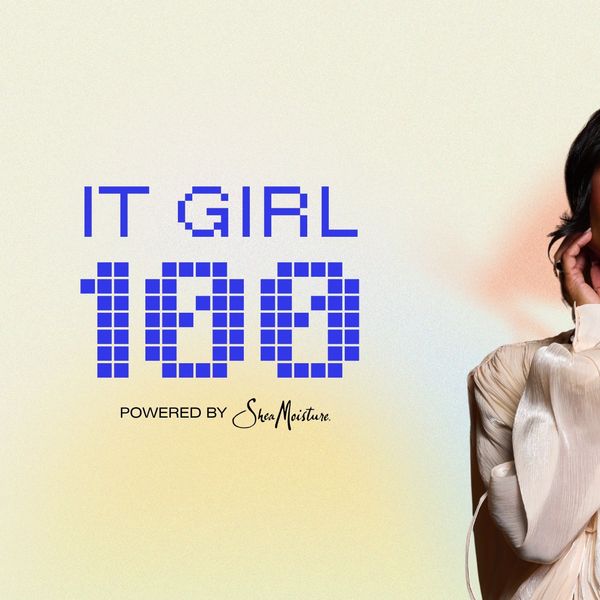10 Reasons ‘Love Jones’ Still Does It For Black Love & The Culture
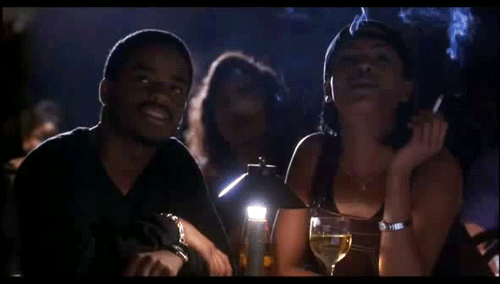
I must admit that, when I saw that Love Jones had finally—yes, finally—made it onto Netflix's viewing library, there was a part of me that smiled—a lot. Even though I've personally seen the movie so much at this point that I can almost recite the lines, verbatim, along with all of the characters, I think it's cool that a movie that is—wow—now over two decades old is something that still resonates so much with those of us who were in our 20s when it came out and with millennials and Generation Z even now.
I'm telling you, out of all of the Black movies that I'm a fan of, Love Jones continues to remain at the top of my list. It's so real. It's so relatable. It's so Black. And that is why, when I heard that it was a new Netflix feature, I asked my editor if I could pen a piece on why it's the kind of timeless classic that should warrant cozying up on the couch with your boo, having some of your girls over to watch it while sipping a little wine or introducing it to a college student who thinks it's too old to be personally relevant.
There are probably a billion reasons why I think Love Jones is an awesome tale of Black love and a great depiction of Black culture but, off of the top of my head, here are the 10 that resonate most.
1. The Love Story Is Unapologetically and Unbelievably Relatable
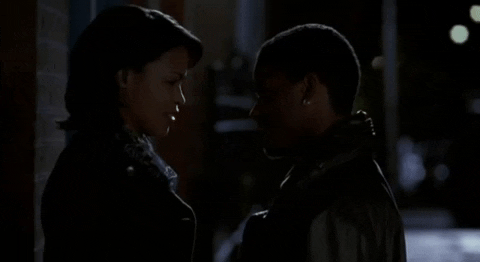
Darius (Larenz Tate) trying to play it cool in approaching Nina as he spills a drink at the bar. Nina (Nia Long) writing on Darius's hand but it being the word "love" and not her number. Darius semi-stalking Nina at the place where she was housesitting (yes, housesitting; she didn't have a job and that is some realism like a mug). Their first date starting off with hanging at some of his friends' house. Them experiencing a first kiss that was so intense that it led to sex—and Darius making an omelet. Darius trying to act like it was all good when she brought up seeing an ex, only to end up going off to Savon about it.
Nina showing up with Hollywood at Sheila's party, getting embarrassed while masking it as anger, Darius offering to walk her to her cab stop and saying one of my favorite lines of the film—"Stomping up and down like you lost your f—kin' bike." Nina taking Darius on a date and then trying to play coy when she was horny as well. Darius acting like he didn't care when Josie told him that Nina was leaving and then him trying to chase Nina down.
If you're a fan of the movie like I am, you know I could go on and on.
To me, one of the best things about Love Jones is it reminds us that relationships are euphoric…and messy…and wonderful…and frustrating. Darius and Nina weren't perfect or even really perfect for each other. But they loved each other, they desired each other, and that combo put the will in them to make their relationship work. Between that and the movie being set in Chicago, along with all of the Black culture nuances that ran throughout the entire film—y'all, if that ain't real and unapologetic, not just love but Black love, I don't know what is.
2. Darius and Nina Remind Us Great Sex Only Gets One So Far
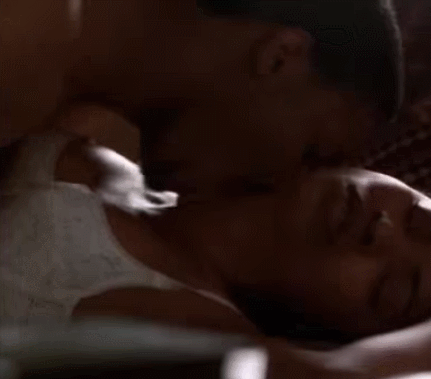
I can't remember exactly where I saw or read it, but I do know that many women have praised the kissing skills of Larenz Tate (Vivica especially shouts his skills out on Sway right here). As far as the first kissing scene in Love Jones, it was so magnetic that it earned an honorable mention in The Atlantic's "Actually, Kissing Is Good" article. I get it too. Honestly, if I had to provide a list of some of the best sex scenes in a movie, Love Jones would go on that list. Nia and Larenz have some off-the-charts chemistry and, whenever I watch the movie, I must admit that it takes me back to some of my own experiences in real life (le sigh).
But about halfway into the movie, you know what else happens? I am reminded of why I thought it was important to pen articles like "Don't Mistake A Great Sex Partner For A Great Life Partner" and "Experts Believe Passion (Not Love) Makes Sex Better. You Agree?". If you pay really close attention to how everything played out, you'll notice that a lot of what Darius and Nina shared was passion. It was really after breaking up and experiencing some independent growth that they got to the healthy love portion of the program.
Oxytocin. Orgasms. Each is one hell of a drug. Just because someone puts the "Boon doon"—as Darius called it—on you, that doesn't automatically make them your soulmate. It takes a heck of a lot more than sexual chemistry to make a relationship work and last. Love Jones teaches this lesson oh so well.
3. They Also Teach Us That Game-Playing Gets People Absolutely Nowhere
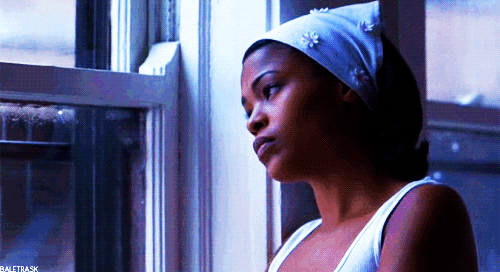
I recently penned a piece on here entitled "Women Cheat More Than We Think. What To Do If That's You." As I was reading some of the comments across our socials, I was doing a mixture of laughing and shaking my head (side to side, not up and down) because it never fails—when men cheat on women, they are jerks, full stop. When women do it, there is always a justifiable explanation. It's not totally wrong just…"kinda wrong" (if y'all say so).
Nina, boy. Her homie Josie was her girl and everything, but that advice she gave Nina regarding telling Darius about seeing Marvin to see if Darius would get jealous is emotional manipulation 101. So was Nina going there, coming back and trying to jump bad about Darius hanging out with his something-to-do-sometimes "friend", Lisa. Then, once they worked through that, Nina picked another fight over Lisa calling Darius even though Darius never asked about her kicking it with her ex or her dating his homeboy Hollywood. The games we play, y'all.
Even though the blow-up that caused Darius and Nina to break-up was hard to watch, what I liked about it is everything got out in the open; they were able to take some time apart, process, and come ultimately back together in a much more real and honest space.
Remember in the movie Two Can Play That Game (Morris Chestnut and Vivica A. Fox) where the main female character said at the end that she realized you can't control a man with games and rules—especially ones that you may not be keeping yourself? Love Jones is a movie that echoes this sentiment. Very well. Any time you're tempted to play a game or two, watch the movie instead for a little bit of a reality check.
4. All of Us Know Each of the Main Characters in Real Life
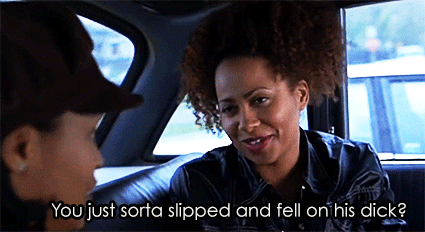
You know acting is done well when you kind of forget that that's what's happening right in front of you. The cast of Love Jones had such good chemistry and dialogue with one another that sometimes I wonder if they went off script and ad-libbed a lot of their stuff. Either way, pretty much every character reminds me of someone who I personally know to this day.
Think about it. All of us have an always-horny-always-keep-it real friend like Josie (Lisa Nicole Carson). All of us have a Sheila (Bernadette L. Clarke) who has no screen saver on her face and is constantly throwing side-eyes. All of us have an Eddie (Leonard Roberts) who is the king of "It's not what you say, but how you say it." And, all of us have a hatin' ass "friend" like Hollywood (Bill Bellamy) who we tolerate because he's funny as hell.
If Living Single is an ode to Black friendship on the tube (and it is), Love Jones is definitely an ode to Black friendship on the big screen, which brings me to my next point.
5. The Friendships Are Loyal, Authentic and Healthy (Except for Wood)
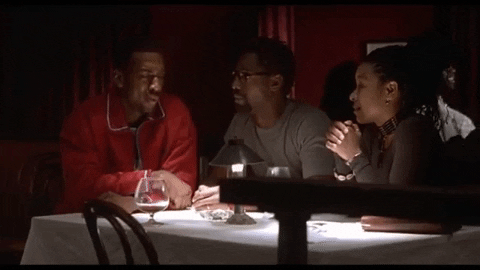
When Nina broke up with (whew, he was fine) Marvin (Khalil Kain), Josie helped her pack. When Savon was cheating on his wife with a fellow teacher, Darius called him out on it. When Wood was the wackest and pulled a Lil' Fizz (some of y'all will catch that later), the entire team let him know how foul he was for doing so. Yeah, something else that I really like about Love Jones is it's not just a romantic love story; it's a platonic one was well. It beautifully depicts intimacy between men and men, women and women and women and men—single and married alike. It's a reminder that Black love has layers and each one is stunning in its own signature and purpose-filled way.
6. Isaiah Washington Was Still Woke Back Then
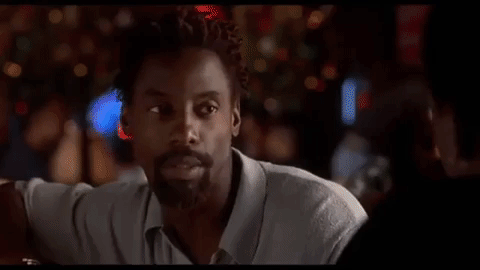
2019 has blown my mind on a few levels. And while what I'm about to say probably doesn't even scratch the Top 50, it is something that caught me off guard and is relevant to this list. As a fan of the art of acting, Isaiah Washington gets his props in my book. Crooklyn. Girl 6. Dancing in September. Soul Food (the series). Get on the Bus. His bumpy-yet-still-relevant ride on Grey's Anatomy. An indie flick where he was pure evil—The Undershepherd. And yes, as the—at least to me—sexy hubby who dished more wisdom than he could take but was still conscious and woke, Savon in Love Jones. And that doesn't even really scratch the surface of Isaiah's IDMB credits.
But after he caught a few of us way off guard by announcing to the world that he was (what in the world?!) a Trump supporter (le sigh again), I've actually watched Love Jones a couple of times this year, just to remind myself that Isaiah and Savon used to have a whole lot more in common than they seem to now. Savon, talk to your boy. Goodness.
7. Creatives Are Winning
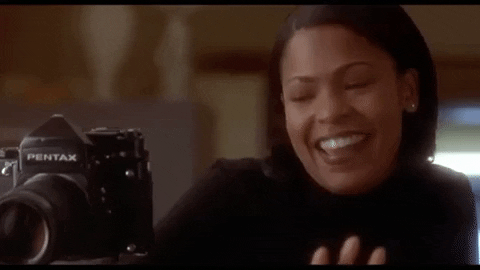
Nina is a photographer. That's dope. As a fellow writer and author, Darius quitting his job to write a book is magnificent to me. Yes y'all, not only were these two lovers both creatives, they supported one another's craft; you've got to give that props on a whole 'nother level.
Plus, the movie offers another teachable moment when it came to their professions. While they were both living in Chicago, I think a part of why they couldn't make their relationship work was because they were still trying to manifest their purpose. But isn't it interesting that once Nina moved to New York to work for, I believe it was Vibe and she thrived for a year, Darius was able to complete his novel? Then, once they were able to scratch their professional itches, they could finally get their personal lives on track?
If you're someone who is a creative and is currently on the fence about stepping out, or if you are trying to figure out if you need to put a relationship on hold until you can figure out what you want to do and be, Love Jones definitely has some scenes that you'll totally be able to connect with; they might even offer you a bit of much-needed clarity too.
8. It’s One of the Greatest Shout Outs to the Art of Spoken Word
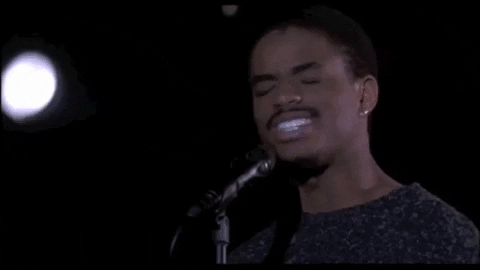
I got my start in writing as a spoken word artist. I used to be a house poet at a joint called The Spot here in Nashville. As life would have it, the very first standing ovation that I ever received was for a piece called I'm Single and That's All Right with Me (that's still the case, by the way). I penned and performed it in the fall of 1997. Spring of 1997 is the year that Love Jones was released. Looking back, I'm pretty sure that it provided some of the inspiration that I needed. Anyone who is a spoken word artist or poet (which are similar but not exactly the same; spoken word artists and poets know that), they probably have a soft spot where this movie is concerned, simply because it pays homage to the art form. Not to mention the fact that Darius's "Brother to the Night"/"A Blues for Nina" is a classic piece. It was back then. It still is—even now.
9. The Cinematography Is (Still) on Point
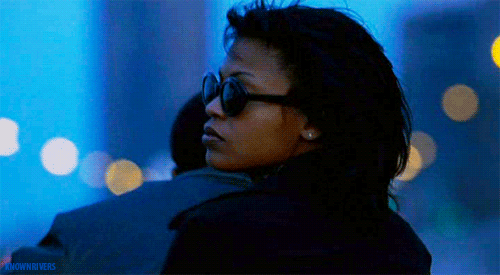
As a fan of film, I really dig cinematography and yes, there are scenes from Love Jones that are truly unforgettable. Scenes like when Nina is riding on the back of Darius's motorcycle or when they are playing Hide and Seek (I guess that is what they were doing) while running on a foggy day in the park. There's Darius as he was chasing Nina's train at Union Station. Oh, and don't even get me started on how Nina has a way of always keeping her make-up looking both timeless and flawless or how, when a lighting team knows what they're doing in the presence of greatness—that would be us—Black people shine on a whole 'nother level.
There are some Black films that are cool as far as the screenplay and/or acting goes that I still don't enjoy watching that much because the visuals are dated, corny or both. Yet although I am fully aware that Love Jones is 22-years-old, and it does have a bit of a vintage feel, it still looks good. The cinematography was well done. Very much so.
10. The Soundtrack Is One of the Best…Ever
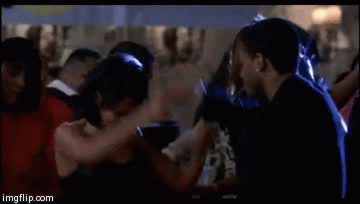
I reference music a lot in the copy that I write because music is something that I adore on so many levels. And as if all of the other reasons that I just provided weren't enough of a reason to load up your Netflix tonight, another reason to remain a fan of Love Jones until the end of time is because of the soundtrack. Listen here. There's "Hopeless" (Dionne Farris). "I Like It" (The Brand New Heavies). "The Sweetest Thing" (Lauryn Hill). "Rush Over" (Marcus Miller and Meshell Ndegeocello). "In a Sentimental Mood" (John Coltrane and Duke Ellington). And the song that needs to be on everyone's sex playlist—Maxwell's "Sumthin' Sumthin': Mellosmoothe". And shoot, those are just my personal favorites.
Man. I can't believe that penning all of this has gassed me up, once again, to either watch the movie, listen to the soundtrack, or both. But that's the power of a good film. Especially a great Black one. Good move, Netflix. Good freakin' move.
Feature image on Giphy
- New On Netflix: November 2019 - xoNecole: Women's Interest, Love ... ›
- What's New On Netflix: November 2020 - xoNecole: Women's Interest, Love, Wellness, Beauty ›
- The 7 Black Sexiest Love Scenes Of All Time - xoNecole: Women's Interest, Love, Wellness, Beauty ›
- Best Sad Movies On Netflix - Saddest Movies - xoNecole: Women's Interest, Love, Wellness, Beauty ›
- Teri from 'Soul Food' Is Owed an Apology - xoNecole: Women's Interest, Love, Wellness, Beauty ›
- Love Jones 2? Larenz Tate explains why it's been difficult to get a ... ›
- Best Black Movies: 36 African American Films To Watch Right Now ... ›
- Reflecting on Love Jones 20 years Later | HuffPost ›
- With 'Love Jones,' black love took center stage: An oral history - Los ... ›
- 'Love Jones' Soundtrack Turns 20 - Essence ›
- 20 Years of 'Love Jones'—and Its Relationship Lessons • EBONY ›
This Is How To Keep 'Holiday Season Stress' From Infecting Your Relationship
Hmph. Maybe it’s just me, but it seems like there is something really weird happening in the fall season air (because winter doesn’t officially begin until December 21) that cuddle season is in full swing while break-up season is as well. In fact, did you know that break-ups are so popular during the holiday season that December 11 is deemed Break-Up Day?
The reasons why relationships shift around this time vary; however, I did both roll my eyes and chuckle when I read that a very popular one is because it’s an easy way to get out of getting one’s significant other a Christmas present. SMDH.
Anyway, I personally think that the less shallow folks out here may contemplate calling things “quits” or they at least distance themselves a bit from their partner (and what I’m referring to is serious relationships) due to all of the stress and strain that oftentimes comes with the holidays whether it be financial, familial, due to their tight schedules or something else.
Listen, I would hate for you and your man to miss the fun and happiness of experiencing this time of year, all because you are so overwhelmed or irritated that you can’t really enjoy it. That’s why I have a few practical tips for how to avoid allowing the typical holiday season stress from INFECTING your relationship.
Manage Your Expectations
 Giphy
GiphyUnmanaged expectations. If there is a main reason why the holiday season tends to be so stress-filled for so many people, I’d bet good money that this is the cause. And when you’re in a long-term relationship, expectations can manifest themselves in all sorts of cryptic and/or unexpected ways. You might have relatives who assume that you are going to be with them for Thanksgiving or Christmas when you have other plans in mind. You might be thinking that you are going to spend one amount for presents while your man is thinking something totally different. When it comes to scheduling, your signals may be crossed.
And you know what? To all of these scenarios, this is where clear and consistent communication come in. Don’t assume anything. Don’t dictate anything either. From now until New Year’s, mutually decide to check in once a week, just to make sure that you are both on the same page as it relates to the holidays and what you both are thinking will come along with it. The less blindsided you both feel, the less stressed out you will be. Trust me on this.
Set (and Keep) a Budget
 Giphy
GiphyOkay, so I read that last year, 36 percent of Americans incurred some type of holiday-related debt. Hmph. Last year, there was still some sense of normalcy in this country, chile, so I can only imagine what finances are gonna look like over the next several weeks. That said, since I don’t know a lot of people who don’t find being broke stressful, make sure that you and your bae set a budget and then stick to it this year — no ifs, ands or buts.
Because really, y’all — it doesn’t make sense to deplete savings and/or max out credit cards for a few days of giggles only to be damn near losing your mind because you don’t know how to make ends meet come Dr. Martin Luther King, Jr. Day.
And by the way, this tip doesn’t just speak to things like food and gifts; I also mean travel. If it doesn’t make a ton of sense (or cents) to be all over the place this year — DON’T BE.
Keep Matthew 5:37 at the Forefront
 Giphy
GiphyIf off the top of your head, you don’t know what Matthew 5:37 says, no worries, here ya go: “But let your ‘Yes’ be ‘Yes,’ and your ‘No,’ ‘No.’ For whatever is more than these is from the evil one.” That verse right there? Oh, it’s a boundaries lifesaver! I say that because do you see “maybe” or “I’ll think about it” in there? Nope. LOL. It says that you should tell people “yes” or “no” and leave it at that — and that complements Anne Lamott’s quote, “’No’ is a complete sentence” impeccably well. Yeah, you’ve got to remember that anything beyond a yes or no to a request is privileged information; you don’t owe anyone details or an explanation.
Besides, if you are really honest with yourself, when someone asks you something and you give a “Umm, let me think about it” kind of reply, more times than not, you already know what your answer is going to be — so why not let you both off of the hook? Give your response. Commit to that. And let everyone (including yourself) get on with their lives and schedules.
I promise you that when it comes to those holiday parties, you are pissing more folks off by not RSVP’ing or doing so and not showing up than just saying, “Thank you but not this year” off the rip.
Remember That Your Personal Space Is Privilege Not a Right
 Giphy
GiphyA friend of mine recently bought a new house and invited me over to come see it. He’s a single man with no children, so as I was taking in all of the space that he had, especially as I walked through his finished basement, I joked about relatives coming to live with him. “Hell no” and “absolutely not” were pretty much his immediate responses as he went on to say that some folks even had the nerve to be offended when he told them that he had no intentions on taking DNA in.
Ain’t it wild how people think that your stuff is their right? And yes, that brings me to my next point. Your home is your sanctuary space. If you want to host folks this year — cool. If not, ALSO COOL. Please don’t let folks (family included) guilt you into how they want you to act or even into what they would do if the shoe was on the other foot. You are not them — and as one of my favorite quotes states, “If two people were exactly alike, one of them would be unnecessary.” (A man by the name Larry Dixon said that.)
Hell, my friends? They know that I am good for sending them random things that they need or even want all throughout the year. Coming over to hang out at my pace, though. Uh-uh. Chalk it up to being a card-carrying member of the ambivert club yet I like keeping my living space personal — and I sleep like a baby, each and every night, for feeling that way.
Always remember that your space, your time, your resources, your energy and shoot, yourself period (including your relationship), are all things that are your own. You get to choose how, when and why you want to share them. The holiday season is certainly no exception.
Cultivate Some “You Two Only” Traditions
 Giphy
GiphyIt’s not uncommon for some couples to hit me up after the holiday season to “detox.” Sometimes it’s due to the financial drama (and sometimes trauma) that they experienced. Sometimes it’s because they allowed their relatives (especially in-laws) to get more into their personal business than they should’ve. More than anything, though, it tends to be because they didn’t get enough quality time together and so ended up feeling “disconnected.”
Please don’t let that happen. Listen, I’m not even a holidays kind of woman and yet, I will absolutely sit myself down with some hot chocolate and chocolate chip cookies to enjoy a Hallmark holiday film or two. Aside from the fact that most of them are lighthearted and sweet, I also like that they usually focus on couples loving on each other amidst all of the holiday beauty and ambiance — which is something that all couples should set aside some time to do.
Maybe it’s a vacation. Maybe it’s a staycation. Or maybe it’s my personal favorite, A SEXCATION. Whether it’s for a few days, the weekend or even overnight — don’t you let the holidays go by without setting aside time for you and your man to celebrate one another. Don’t you dare (check out “Are You Ready To Have Some Very Merry 'Christmas Sex'?”).
GET. SOME. REST.
 Giphy
GiphyI once read that 8 out of 10 people get stressed out over the holidays and 3 out of 10 lose sleep during to it — and when you’re stress-filled and sleep-deprived, that can absolutely lead to hypersensitivity, making mountains out of molehills and even not being in the mood for sex.
Your relationship can’t afford to go through any of this, so definitely make sure to prioritize rest. I don’t care how unrealistic it might seem during this time, sleep should never be seen as a luxury; it will always and forever be a great necessity.
That said, try to get no less than six hours of shut-eye in (check out “6 Fascinating Ways Sex And Sleep Definitely Go Hand In Hand”) and even ask your bae to take a nap with you sometimes (check out “Wanna Have Some Next-Level Sex? Take A Nap, Sis.”). Not only will sleep help to restore your mind, body and spirit but, when it’s with your partner, it’s an act of intimacy that can make you both feel super connected, even in the midst of what might feel like chaos.
___
Holiday season stress is real. Still, never give it the permission or power to throw your relationship off. Put you and your man first and let the holidays be what they are gonna be, chile.
Let’s make things inbox official! Sign up for the xoNecole newsletter for love, wellness, career, and exclusive content delivered straight to your inbox.
Featured image by Shutterstock
Dreaming Of A White Christmas? These 7 Winter Wonderland Destinations Are Perfect For The Holidays
While most people opt for a tropical vacation during the winter months, there are still many people who want to fulfill their winter wonderland fantasies, which are more than likely centered on watching snow by the fireplace while sipping some hot cocoa.
With Thanksgiving vastly approaching and Christmas a little under a month away, there is still time to ditch the traditional Christmas home to visit family or friends.
Whether you’re looking to put a new stamp on your passport and keep things domestic with a destination in the States, xoNecole has you covered with a few hotspots for those itching to go somewhere cold (but with cozy vibes) this holiday season.
Aspen, Colorado
Our Christmas queen, Mariah Carey, has been taking an annual trip to this snowy destination since 1997, just three years after dropping the track that would make her the unofficial (but official to us) ambassador of the winter holiday.
Aside from being a key vacation spot for one of the culture’s greatest musicians, Aspen also offers travelers access to world-class skiing and snowboarding and four distinct mountains that provide the perfect backdrop for a winter vacation.
Whistler, British Columbia, Canada
Home to the largest ski resort in North America, Whistler Blackcomb, this destination is located in the Coast Mountain Range and is about 75 miles north of Vancouver.
From luxury spas like Scandinave Spa Whistler to Olympic Park, this is another top winter vacation spot that offers a unique experience for people who love snow and the thrill of a good adventure.
Western Massachusetts
Dubbed the place for a magical holiday escape, Springfield, Massachusetts, blends the warmth of small-town charm with unforgettable experiences like Grinchmas at Springfield Museums, Winterlights at Naumkeag in Stockbridge, Historic Deerfield’s Winter Frolic, and many others.
This destination offers something for all ages, and it’s close to home, making it all the more reason to place on your radar for a winter getaway.
Rovaniemi, Finland
If you want to really get into the Christmas spirit, this just may be the place for you. As the official home to Saint Nick himself, Rovaniemi, Finland offers reindeer sleigh rides, the opportunity to stay in a glass igloo, as well as an opportunity to experience the Santa Claus Village.
Lake Tahoe, California/Nevada
Who says that visits to the lake house are only reserved for summer vacation? A winter trip to Lake Tahoe is equipped with stunning lake views and top-notch ski resorts, including Heavenly and Northstar.
Chamonix, France
Sitting at the base of Mont Blanc, Chamonix, France, is known for its skiing and mountaineering. This destination is home to the Aiguille du Midi cable car, the charming Alpine village, and is also close to various other European ski destinations.
Northeastern Pennsylvania
This area of the U.S. state is home to the Poconos Mountains, whose renowned ski resorts include Camelback Mountain, Blue Mountain, and Jack Frost Big Boulder. Whether you’re a ski expert, a beginner, or just there for the vibes, this destination makes for a winter vacation that balances fun adventures and cozy getaways. Additionally, Pennsylvania is home to the Christmas Tree Capital of the world.
Feature image by Shutterstock
Originally published on November 23, 2024






